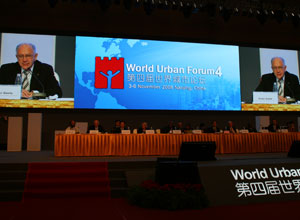Rede
Nanjing/China, 03.11.2008
Opening Speech World Urban Forum IV
"Harmonious Urbanization: The Challenge of Balanced Territorial Development"
Excellencies,
Honourable colleagues,
Ladies and Gentlemen,
On behalf of the Global Parliamentarians on Habitat I would like to express my profound thanks for UN-HABITAT’s invitation to this World Urban Forum.
Over a hundred parliamentarians from around the globe have gladly accepted the invitation to come to Nanjing and discuss how cities can be supported on their way to becoming sustainable cities.
The Global Parliamentarians on Habitat is an international organisation of parliamentarians which is mainly concerned with the sustainable development of urban settlements. The group was founded over thirty years ago in Vancouver and has since been working in close cooperation with UN-Habitat.
This year in Bucharest I became president of our parliamentarians’ organisation when I took over the task from my friend and colleague, Senator Eloy Cantu Segovia of Mexico.
I would like to take this opportunity today to express my gratitude to Senator Cantu for his outstanding leadership and excellent teamwork.
Ladies and Gentlemen,
The Global Parliamentarians on Habitat meet regularly at national, regional and global level. This World Urban Forum in Nanjing offers us a good opportunity not only to do our part to make this conference a success, but also to gather together and coordinate our own work at international level.
During the conference we are particularly interested in coming into direct contact with the responsible representatives of UN-Habitat.
I would like to thank Executive Director Dr Anna Tibaijuka, Markandey Rai and Rolf Wichmann for their fruitful cooperation and support in preparing this conference.
My special thanks go to China as the conference host. Dear Chinese hosts, dear Minister Jiang Weixin, we are very happy to be guests in your dynamic country.
Ladies and Gentlemen,
As parliamentarians it is our task to create favourable conditions for a better world through good legislation.
At the moment we are experiencing three major worldwide crises, with which we have to come to terms:
1. an economic crisis caused by the collapse of the financial markets,
2. a widespread national security crisis generated by the threats of terrorism and
3. an environmental and energy crisis.
All three crises are interrelated and interdependent.
Let me give you an example:
• the western world borrows money from China,
• uses the money to buy expensive oil from the Persian Gulf,
• then burns the oil,
• with all of the negative consequences for the climate.
We, who are alive today and bear political responsibility, have to change this: each in his or her position, in government, as a parliamentarian, as a mayor or as an NGO. We are responsible for the future of our children.
Together we can combat terrorism. Hopefully we will soon overcome the worldwide financial crisis. But the crisis of climate change will remain with us.
By the middle of the 21st century two-thirds of the world’s population will be living in cities. At the moment the cities already account for seventy-five per cent of energy consumption and about eighty per cent of carbon emissions. Nobody would deny that large agglomerations are the biggest generators of climate change.
The most important resource in climate protection is political will.
As a former mayor I know perfectly well: cities are unable to win the struggle against climate change entirely on their own. Governments and parliaments are needed here.
We have to create sustainable laws in order to prevent climate change and global warming from becoming a threat which cannot be reversed. The negative consequences particularly affect people living along the banks of rivers or directly on the coastlines. Usually they are the poorest of the poor.
But the cities themselves can and must make important contributions to climate protection as well, for instance through urban planning or energy efficiency in public buildings.
Without a doubt, the cities and regions are of key importance in implementing sustainable development. We need a competition between cities for the best climate protection.
At the ‘Round Table’ we have organized for tomorrow afternoon, we parliamentarians from Asia, Africa, America and Europe will engage in a concentrated discussion focussing on ‘Cities and Climate Change’.
We want to exchange our experiences and look for ways of achieving improvements for the people. Above all we want to discuss which contributions we can make by creating better laws.
Together with government representatives, mayors, NGOs and business we want to make it clear that changes in energy consumption patterns and climate change represent important challenges in sustainable urban development. Swift action is necessary.
We have to take on this responsibility!
Let us work together on the challenges of the future. If we have the political will, we will succeed.
I wish the conference every possible success.

